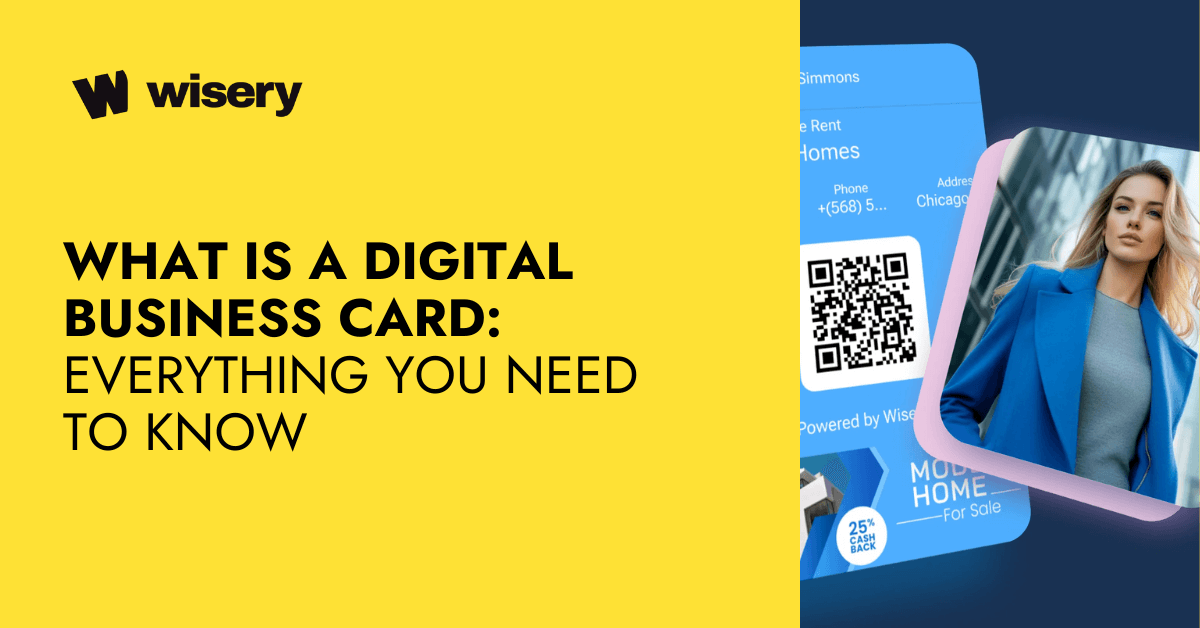
What is a Digital Business Card: Everything You Need to Know
The digital age has dramatically transformed the way we connect, and traditional networking methods are no exception. Digital business cards have emerged as a modern solution that is quickly replacing their paper alternatives. Not only are they eco-friendly, but they also offer a host of features designed to make networking more efficient and impactful.
In this article, we’ll explore the world of digital business cards, uncovering their benefits and how to use them effectively. Whether you’re a seasoned networker or just starting out, understanding this tool can significantly enhance your professional connections.
Contents:
- What is a Digital Business Card in 2024?
- Understanding Terminology: Digital, Virtual, and Electronic Business Cards
- Benefits of Digital Business Cards
- How Digital Business Cards Work
- Practical Usage of Digital Business Cards
- Essential Features of Best Digital Business Cards
- Security Considerations for Digital Business Cards
- Who Can Benefit from Digital Business Cards?
- Common Mistakes to Avoid with Digital Business Cards

What is a Digital Business Card in 2024?
A digital business card is a modern, electronic equivalent of the traditional printed business card. It is a dynamic, interactive tool for networking that can be accessed and shared digitally, and serves as a virtual representation of a professional’s identity, providing a platform to showcase not only essential contact details such as company name, job title, phone number, and contact information but also a broader range of professional information. This can include links to personal websites, online portfolios, social media accounts, and even multimedia content like videos or presentations.

Understanding Terminology: Digital, Virtual, and Electronic Business Cards
You might think “digital”, “virtual business card,” and “electronic business card” mean the same thing, but there are actually some key differences between them. Understanding these distinctions can help you choose the right card for your needs.
How do digital business cards work? It is the broadest term, covering any business card stored, shared, or managed electronically. These can be accessed through apps, email, or websites and are more eco-friendly than traditional paper cards.
What is a virtual business card? Unlike paper business cards, virtual card is specifically designed for online sharing. They’re usually accessed through a link or online profile and are great for remote networking. You can easily share them via email or social media links.
Electronic versions are created using specific digital formats or digital tools. There are different types, like vCards that you can add to your digital address book, NFC cards that share info with a tap, or QR code cards that link to a digital profile.
With so many options, it’s important to choose the solution that best fits your networking style and the people you’re connecting with.
Benefits of Digital Business Cards
Digital business cards offer numerous advantages over traditional business cards. They are eco-friendly, reducing the need for paper, ink, and printing, which helps lower your carbon footprint.
They are also cost-effective, eliminating printing costs and allowing easy updates without reprinting. Convenience is another significant benefit, as digital cards can be easily shared via email, text, social media, or QR codes, ensuring you never run out of cards at events.
Moreover, they are highly customizable, allowing you to instantly update and send your card with new information or branding and include links, multimedia, and custom designs.
Another key advantage is integrating digital wallets like Apple Wallet and contact management systems for easy access and organization. This enhances networking efficiency by allowing you to share your card instantly at events, virtual conferences, and meetings.
How Digital Business Cards Work
Digital business cards can be created and shared through various methods. Mobile card apps are a popular choice, offering templates to streamline the card creation process and lets you create, customize, and share them quickly. QR code business cards are another standard method; you can generate a QR code that links to your digital card, and recipients can scan the code with their smartphones to access your information. NFC technology is also widely used; NFC (Near Field Communication) business cards allow you to share your card by simply tapping your phone against another NFC-enabled device. Additionally, you can embed a link to your card in your email signature for easy sharing.

Practical Usage of Digital Business Cards
How to use and make a digital business card?
Digital business cards offer a versatile marketing channel for customer acquisition and professional networking. Their utility extends beyond traditional card exchange, encompassing a wide range of professional scenarios.
In the dynamic context of networking events, conferences, and industry gatherings, digital business cards streamline the process of contact sharing. They eliminate the need for physical cards exchange, facilitating efficient and timely connections.
Furthermore, virtual meetings and remote customer interaction have become increasingly prevalent in the contemporary business landscape. Digital business cards excel in this environment, providing a convenient and effective method for exchanging contact information.
Beyond formal networking settings, digital business cards prove invaluable in daily professional interactions. Whether encountering potential clients, partners, or industry peers in casual or formal settings, sharing a card offers a modern and efficient approach to digital contact exchange. Additionally, such an extra feature like embedding a link to the digital business card within email signatures or social media profiles can serve as a subtle yet effective means of expanding professional network.
By strategically leveraging the capabilities of digital business cards, professionals can optimize their networking efforts and cultivate meaningful connections.
To enhance your digital presence consider using Link-in-bio tools, which allow you to share multiple links through a single, customizable landing page, making it easier for your audience to access your website, social media profiles, products, and content seamlessly.
Essential Features of Best Digital Business Cards
When selecting the best digital business card platform, several essential features should be carefully evaluated to ensure the chosen solution aligns with your professional needs. Customization is paramount, allowing you to create digital cards that reflect your personal or corporate branding strategy. This includes the ability to incorporate logos, high-quality images, a virtual background and a consistent color scheme.
Interactive elements significantly enhance the functionality of a digital business card. Clickable links to a social media profile, personal website, or online portfolios provide convenient and quick access to additional information. Integration with popular contact management systems is crucial for efficient organization and management of collected contacts.
Security is a critical consideration when handling sensitive contact info. A reliable digital business card platform should prioritize data protection through encryption and other security measures. Additionally, the ability to create multiple cards for different professional or personal contexts can be advantageous. For instance, individuals may require separate cards for business networking, personal connections, or specific industry events. By carefully considering these factors, professionals can select a solution that effectively meets their needs and elevates their professional image.
Security Considerations for Digital Business Cards
While digital business cards offer numerous advantages, it is imperative to prioritize security and privacy. Safeguarding personal and professional information is paramount in today’s digital landscape. When selecting a digital business card platform, it is essential to prioritize providers with robust data privacy and protection measures.
To mitigate potential risks, employ secure sharing methods such as encrypted links or QR codes. Additionally, platforms that offer granular control over card visibility and sharing preferences are essential. By limiting who can view and share your digital business card, you can significantly reduce the risk of unauthorized access to your contact information.
Regularly updating your card is crucial to maintain accuracy and prevent the dissemination of outdated or incorrect details. Implementing a consistent update schedule ensures that your professional information remains current and relevant to your network.
By adopting these security measures, individuals and businesses can confidently leverage the benefits of digital business cards while safeguarding sensitive information.It is also advisable to research the platform’s reputation for data security and any incidents of data breaches. Understanding the provider’s commitment to data protection can help in making informed decisions.
Who Can Benefit from Digital Business Cards?
Digital business cards are beneficial for various professionals and industries.
Entrepreneurs and small business owners can easily share contact details and branding without the cost of printing.
Corporate professionals can enhance their networking efforts and maintain a professional image with up-to-date information.
Freelancers and consultants can share detailed contact information and portfolio links with potential customers.
Sales and marketing teams can track interactions and measure the effectiveness of networking efforts.
Event planners and attendees can share contact details quickly at large events and conferences, making your card an invaluable tool.

Best Practices for Sharing Digital Business Cards
Follow these best practices to make the most of your card:
- Personalize your card by including a professional photo and customized branding to make a solid first impression.
- Regularly update your profile picture, contact information and links to ensure accuracy.
- To reach a wider audience, use multiple channels to share your card, such as email address, social media, QR codes, and NFC business cards.
- Following up with new contacts after sharing your card is essential for building relationships.
- Monitoring the results will allow you to adjust your online presence strategy accordingly.
Common Mistakes to Avoid with Digital Business Cards
Avoiding common pitfalls is crucial for the effective usage:
-
- Avoid sharing outdated details. Invest time in designing a professional-looking card that represents your brand identity well at all levels.
-
- Keeping your card concise and easy to read is essential, as too much information can be overwhelming.
-
- Choose a secure platform like Wisery, and be mindful of how you share it.
-
- Failing to follow up with new contacts can diminish the benefits of networking, so always make an effort to connect after sharing your card.
- Failing to follow up with new contacts can diminish the benefits of networking, so always make an effort to connect after sharing your card.
To Sum Up
In conclusion, going digital is a powerful method for modern networking. They offer a cost-effective, eco-friendly alternative to a traditional paper card and come with many features that make sharing and managing contact information more accessible than ever. Understanding how to create, share and use digital business cards effectively can enhance your professional image and maximize your business network in 2024 and beyond.

Stefani Sparysheva
Stefani, a marketing expert at Wisery, thrives on helping businesses unlock their full potential through innovative strategies. With a deep passion for digital marketing, she writes to empower professionals with practical insights and proven tactics for success.